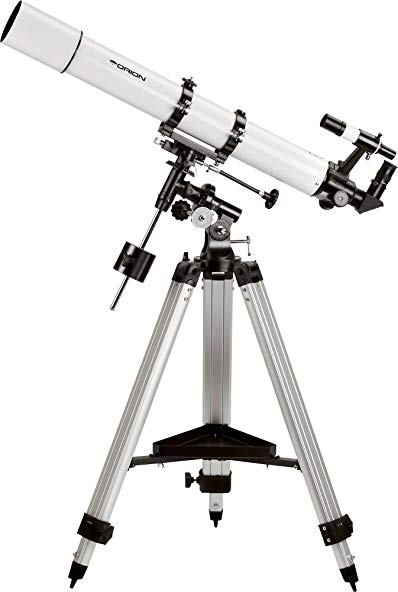- Make sure this fits by entering your model number.
- A powerful, high-quality refractor telescope at a jaw-dropping low price
- 90mm (3.5″) aperture and 910mm focal length for crisp views of deep-sky objects, the Moon, and planets
- Included EQ-2 adjustable tripod and equatorial mount for manual slow-motion celestial tracking
- Includes two Sirius Plossl 1.25″ eyepieces (25mm and 10mm), 6×30 finder scope, smooth-adjusting 1.25″ rack & pinion focuser, 90-degree mirror diagonal for comfortable nighttime performance, Starry Night astronomy software, and more
- Can also be used for pleasing daytime terrestrial viewing with a correct-image diagonal (correct-image diagonal sold separately)
Product description
Now you can have the virtues of refractor-sharp images without having to break into your piggy bank. Our remarkable AstroView 90 gives big returns for a small investment! This is a powerful refractor featuring a multi-coated 90mm objective lens of 910mm focal length (f/10) housed in an enameled aluminum tube. You won’t have any trouble gathering enough light for bright, crisp views of deep-sky objects, the Moon, and planets. Even better, we’ve upgraded the AstroView 90 package with two Sirius Plossl eyepieces (25mm and 10mm)! The AstroView 90 comes equipped with a 6×30 finder, 90-deg star diagonal, adjustable aluminum tripod with accessory tray, and an EQ-2 equatorial mount with slow motion controls for manual tracking. One-year limited warranty.
Amazon.com
Refractors are known for their crisp, high contrast views of the Moon and planets and the AstroView 90 delivers sharp views right out of the box. The low power 25mm Sirius Plossl eyepiece (36X magnification) nicely frames the moon, while the high power 10mm eyepiece (91X magnification) delivers a crisp close up image full of detail. The sharp Achromatic optics of the AstroView 90 EQ also give me delightful views of deep space objects. On a moonless night I like the way the 25mm eyepiece frames the ghostly glow of the Orion Nebula. Zooming in with the 10mm Sirius Plossl eyepiece, I can easily pick out all four stars of the Orion Nebula’s embedded quadruple star the Trapezium. Another night I used an Ultima 2X Barlow with the 10mm plossl eyepiece for a total magnification of 182X while viewing the planet Jupiter. I was rewarded with a clear view of Jupiter’s famous Great Red Spot.
The Equatorial mount included with the AstroView 90 EQ is designed to help track stars and planets at high power. When I set up the telescope, I simply point the polar axis at Polaris, the North Star. This makes it easy to keep celestial objects in the field of view by turning one slow motion knob. Orion also offers the EQ-2M Electronic Telescope Drive which features a battery powered motor for automatic tracking. The EQ-2 equatorial mount is a little wobbly when the legs are fully extended, but that’s normal for any large telescope in this price range.
With excellent optics, classic design, and a very good accessory package, Orion‘s AstroView 90 Equatorial Refractor is an excellent introduction to the world of Astronomy. —Jeff Phillips
Pros:
- Classic refractor design
- Crisp clear views of the Moon and planets
- Two Sirius Plossl eyepieces and 6×30 finder
- Starry Night planetarium software included
Cons:
- Equatorial mount wobbles a bit while focusing
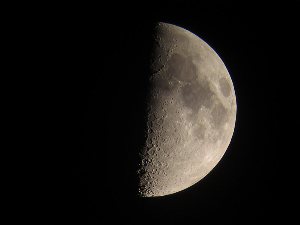 First quarter Moon shot at 36x with Powershot camera |
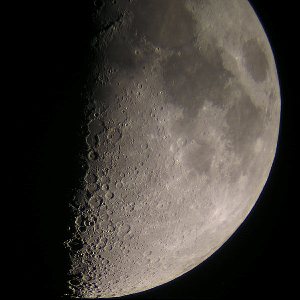 First quarter Moon shot at 90X with Powershot camera. |
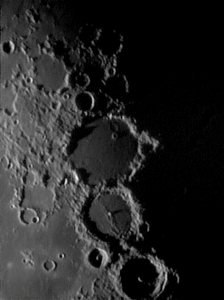 Crater Ptolemeaus shot at 350X with NexImage camera and Ultima barlow. |
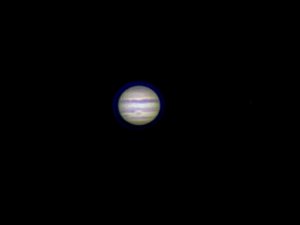 Planet Jupter shot at 350X with NexImage camera and Ultima barlow. |
